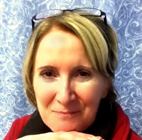Freelancer of the Month April 2013 – Samantha Rawson
0Hi Samantha! Can you tell us a bit about the nature of your business?
I mainly offer my proofreading and editing services to students, academics and businesses, although I have also worked with self-published fiction authors. My copy writing services are quite varied; I’ve drafted documents ranging from executive summaries for business plans to online copy and creative texts.
Tell us about your journey to becoming a freelancer.
I’ve always loved reading and writing, so having a job where I do just that every single day really makes me enjoy my work.
When I was 15, I started doing some voluntary proofreading work for the Project Gutenberg e-books archive. This exposed me to a very wide variety of texts and demonstrated to me that I had the attention to detail needed to be an effective proofreader.
I pursued my love of language academically, completing my BA (Hons) English Language and Literature at the University of Sheffield in 2009. Whilst looking for a permanent job following my graduation, I undertook some proofreading work for a local proofreading company.
I was then offered a job at a local communications firm as a project manager. I later became a senior project manager. My work there did involve some proofreading and writing, but not as much as I would have liked! As a result, in early 2011, I made the decision to become a full-time freelancer under the trading name Proofreading Works. I’ve never looked back!
What do you enjoy most about running your own business?
It makes me genuinely happy to create engaging, new texts or to help people improve the clarity or language of their documents. I also love reading new documents every day.
I also appreciate being able to be there for my family members when they need me, which I could not do when I worked on a non-freelance basis. If I have a spare moment between projects, I take the opportunity to work on my novel.
Have you got any advice for aspiring freelancers?
I think testing your ability is vitally important before making the leap into any freelance industry. I have received so many emails from people looking to undertake proofreading work that have been littered with errors!
You can gain some experience and test yourself whilst still pursuing full-time work or education. This might involve asking your employer or educational institution for relevant projects; for instance, I edited a creative writing magazine for my university and proofread audit reports whilst working at the communications company. You can also ask friends, families or charities for any work that you can do for free.
If you have decided to make the leap into freelancing, I would advise connecting with other freelancers. Not only will chatting with others remove some of the isolation that is associated with freelancing, but you may also develop opportunities to pass on work to one another.
What are the downsides to working for yourself, if any, and how do you overcome them?
The irregularity of work can be quite worrying when you start out as a freelancer. In my first few months, I alternated between quiet periods and hectically busy periods. You need to look ahead and continuously market your business, even in busy times.
How do you go about promoting your business/finding clients?
Most of my clients find me through word of mouth, through my website www.proofreadingworks.co.uk or through business directory websites like Find a Proofreader or FreeIndex.
What is your biggest proofreading pet hate?
I don’t really have any particular hates, as I know that everyone makes mistakes. I’m particularly sympathetic to non-native speakers, having tried to learn German myself for a number of years.
However, any errors that are in the public domain and that have the potential to create confusion or distress are quite worrying. One recent example of this is when the BBC updated their mobile website with the headline ‘Reaction as former UK Prime Minister Margaret Thatcher dies following a strike’, which some have called the most inappropriate typo ever.
What do you enjoy reading when you’re not working with words?
A book collector friend of mine sends me his old copies of novels once he upgrades to first editions, so I have quite a collection of literary fiction. In terms of genre fiction, I particularly love dystopian novels like A Clockwork Orange, The Handmaid’s Tale, 1984, Brave New World, The Road… mostly bleak novels!




